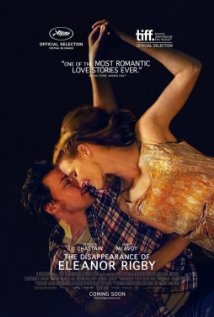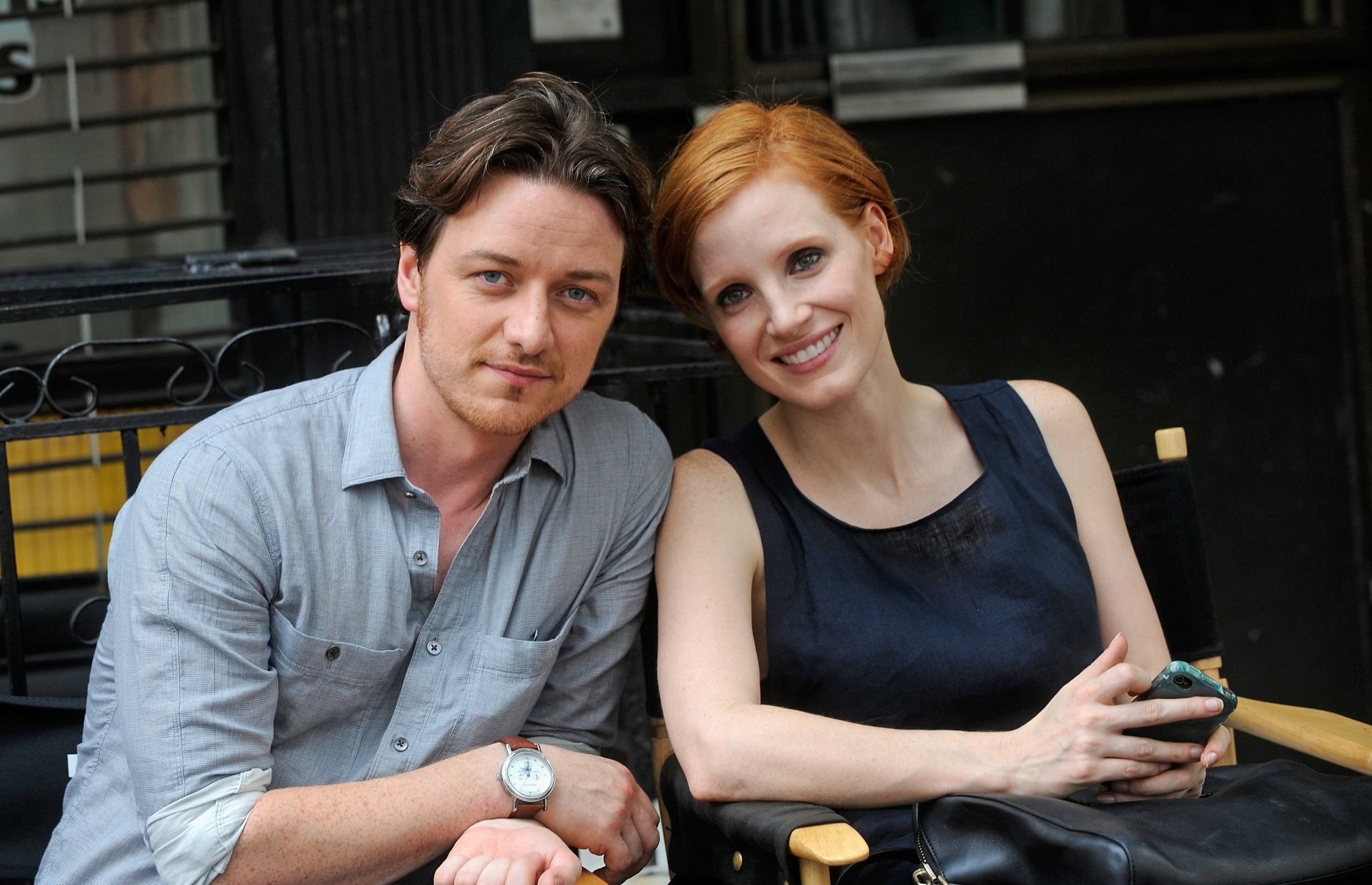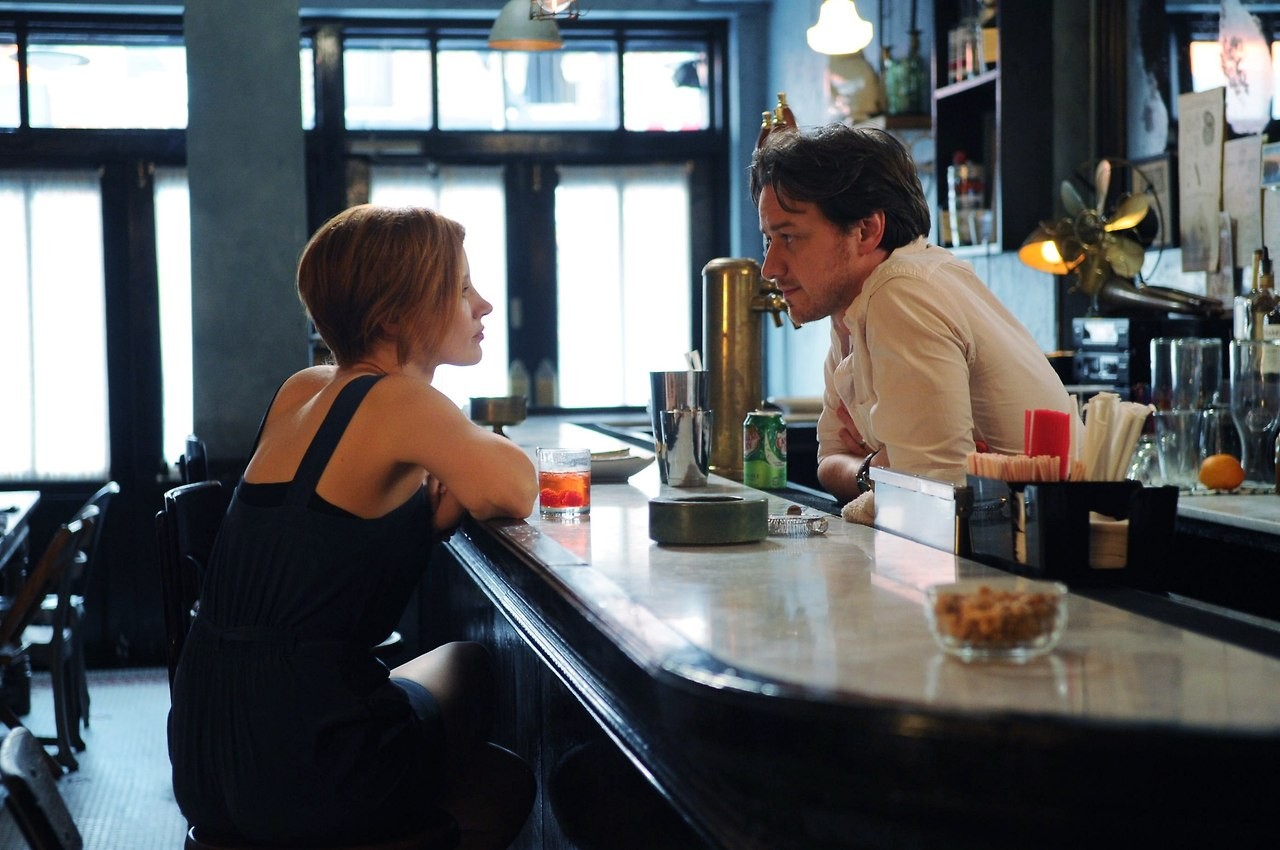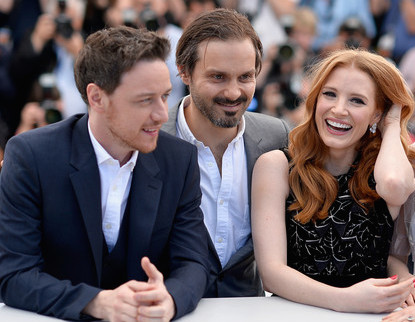abstew in the house to ask a Burning Question...
 Almost a year ago today, director Ned Benson premiered his film debut, an ambitious two part film about the breakdown of a modern relationship called The Disappearance of Eleanor Rigby, at the Toronto Film Festival (and Nathaniel was there). The film was not just one, but two films of the same story, each told from the different viewpoint of its two main characters played by Jessica Chastain and James McAvoy. It was an interesting concept and much like this summer's Boyhood, seemed like an amazing opportunity to show something unique and ambitious in the cineplex.
Almost a year ago today, director Ned Benson premiered his film debut, an ambitious two part film about the breakdown of a modern relationship called The Disappearance of Eleanor Rigby, at the Toronto Film Festival (and Nathaniel was there). The film was not just one, but two films of the same story, each told from the different viewpoint of its two main characters played by Jessica Chastain and James McAvoy. It was an interesting concept and much like this summer's Boyhood, seemed like an amazing opportunity to show something unique and ambitious in the cineplex.
Today the film finally arrives in select movie theaters. However, 12 months later, the way the film is coming to us is far different from the way it was originally conceived. The version that opens in NY and LA this weekend (and expanding next week) is actually a spliced two-hour combination of the two films now subtitled Them (which made its debut at Cannes this past May) with the original concept of two separate films, now called Him and Her, to be released a month later in October. But with three different versions of essentially the same story...
Is there a right way to see The Disappearance of Eleanor Rigby? And perhaps more importantly, can all three films sustain enough interest across so many versions? [more...]

When I was a little kid, I always loved watching movies in different cities or someone else's version of a videotape that I also owned. In my mind, because the characters were essentially real people to me, I imagined that their stories would be different depending on where they were or what story they were sharing with different people. I'm not sure when I finally realized that the movie was the same regardless of where I was or who I was with, but a part of me secretly still looks to see if anything is slightly different. With the three different versions of Eleanor Rigby all being released in theaters, it's a little like my childhood fantasy is coming true. Only this time everyone will be aware of the differences.
The storytelling devise of utilizing different points of view of the same event is hardly a novel concept, with Akira Kurosawa's masterpiece Rashomon, in which 4 different characters recount their version of the same incident, often cited as the best example of multi-narrative filmmaking and a subsequent major influence. The idea of a break-up of a marriage told from the viewpoint of both the husband and wife was also used before in a 1973 two night television event with tumultuous lovers Elizabeth Taylor and Richard Burton called Divorce His, Divorce Hers. And breaking up the story of one film into separate parts released in the theater has been used in everything from Tarantiono's Kill Bill and this year's Nymphomaniac. But while those films are continuations of the story, Eleanor Rigby was seen as two separate films of the same idea that could stand alone. They could be viewed in either order, but viewed collectively would bring greater insight and understanding to the story.

But there are questions that arise about the Him and Her films. When they premiered in Toronto, both parts were shown back-to-back as essentially one three-hour movie. That's also the way they've been presented at press screenings. When they finally arrive as the two parts in October, will they be shown similarly, together on the same movie screen, or will audiences have to pay 2 separate admissions and go to 2 different screens at the theater? It's an interesting idea in theory, a sort of a choose your own theatrical adventure. I feel like most people will want to see both parts, but are moviegoers going to want to spend double admission on the experience? And if they are shown at one price together, why is there the need for a Them version at all?
Benson hadn't even thought of making Eleanor Rigby into two movies until star and producer Chastain (whom he's known for a decade when she was a recent Juilliard graduate in love with his first short film) told him she liked the story but didn't want to play the part as written in the first draft, essentially Him. Which is how the perspective of Her began. But once the films were acquired by The Weinstein Company at the Toronto Film Festival, ol' Harvey Scissorhands decided that 2 films was too unwieldy and that they should be combined into a more manageable (aka conventional) 2 hour running time. But the film was never intended to be seen that way and most critics that have seen all three versions seem to feel that Them lacks the emotional impact that Him and Her create together.
 McAvoy, Director Ned Benson & Chastain in Cannes
McAvoy, Director Ned Benson & Chastain in Cannes
There's also the question of awards qualifications. The Academy states that an actor can't be nominated twice in the same category during the same year. Which is why stars with multiple films try going supporting for one and lead in another. But when you're playing the same character in three different films, how would you campaign? Chastain could go lead in Her and supporting in Him, but will more people have seen Them and would it split the vote entirely? Although Chastain will already be competing with herself this Fall with roles in three other major films (Miss Julie, Interstellar, and A Most Violent Year), so perhaps it's best to not even consider Eleanor Rigby at all in the awards race. Which seems a shame considering the work Chastain has done and how personally she is invested in the film(s).
Any press is good press and perhaps all the debates and think-pieces that have been making the rounds on the internet about all the different versions of The Disappearance of Eleanor Rigby are just the sort of buzz that builds interest. I think people who want to see the film, really want to see the film (there's certainly been anticipation since Toronto and the debut of the film's trailer was met with enthusiasm). With the constant battle of how television is now better than movies, I think a marketing tool like this helps show that movies can still be just as creative. The audiences that are interested, will probably invest in all three versions. And it will most likely find an even larger audience once they're all available to stream on Netflix to watch at your own pace and discover on your own terms. It seems that, for now, one of the more interesting theatrical discussions of the early Fall Film Season will be surrounding which of the versions of Eleanor Rigby works the best. Is there are definitive method to view the films? I think the answer will be as different as each of the films, and drawing your own conclusion will be just part of what makes The Disappearance of Eleanor Rigby a singular experience.